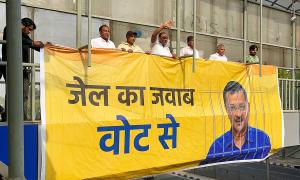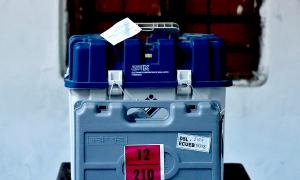China raised a storm of controversy in the United States earlier this year when its cash-rich corporations announced their intention to acquire several American companies, including oil producer Unocal Corp. and appliance maker Maytag Corp.
But while China was bidding for -- and losing -- overseas acquisitions, another big Asian country, India, was also investing abroad, but with a minimum of rancor.
Indian companies, which had a very small presence in foreign locales just a few years ago, have inked 62 overseas deals worth $1.38 billion so far this year, buying up a variety of foreign outfits, from engineering design house INCAT International in Britain to Valeant Pharma in the US That compares with just $202 million in deals in 2002.
The Indian purchases have flown under the political radar because most of them are small -- the average price of recent Indian acquisitions is just $30 million -- and they usually don't involve big-name companies.
Still, the numbers are adding up -- and a buoyant Indian stock market is helping. "Every day, even small-cap and mid-cap companies come to us wanting to buy companies overseas," says Manisha Girotra, India country head for UBS, which advises on such purchases. "Everyone wants access to new markets and to leverage India's low-cost production base."
Surprisingly, the biggest plays have not come from India's vibrant tech and outsourcing sector, which, analysts say, has a sound domestic business model and doesn't see the need to travel boldly abroad.
The big moves are coming from more traditional industries: telecommunications, pharmaceuticals, auto parts, and other manufacturing businesses that want to secure export markets. Indeed, the biggest deal so far this year is an odd one: Mumbai-based TV maker Videocon International Ltd. bought the global color-picture-tube business of France's Thomson for $289.8 million.
Yes, picture tubes are decidedly old technology, but Videocon, one of the largest manufacturers of picture-tube glass, plans to supply its product to the Thomson operations and integrate the businesses.
Most of India's recent acquisitions involve more modern technology.
Leading the charge are drugmakers such as Sun Pharmaceutical Industries, Nicholas Piramal India, and Matrix Laboratories. They employ top Indian-trained scientists and technicians and have become rich producing generic drugs, mostly for local use and other emerging markets.
Now India's new patent legislation, which adheres to international rules, has forced Indian pharma to focus on research and development of new drugs, like its Western counterparts.
Swati Piramal, chief scientific officer of Nicholas Piramal, estimates that the drug industry will raise more than $3 billion in the stock market in the next year for overseas acquisitions, which will facilitate research collaborations and "cross-border brain transfers."
In the biggest pharma deal this year, Matrix bought Docpharma, a Belgian maker of generic drugs, for $263.4 million. It followed up on Sept. 26 by buying 60% of Chinese bulk pharmaceutical firm Mchem for an undisclosed sum.
Ten years ago, India's overseas gold rush would have been impossible. The government in New Delhi imposed severe restrictions on the export of the country's foreign exchange -- in part because there wasn't much of it.
Today, India's booming tech, auto, and pharma businesses have attracted a flood of foreign investment. The country holds reserves in excess of $140 billion, and curbs on foreign investment by Indian companies are largely gone.
Moreover, Corporate India over the last decade has aggressively restructured itself, making management more professional, and increasing efficiencies.
In a long list of sectors, including telecom, auto and auto-parts manufacturing, pharma, and commodities like steel and aluminum, Indian companies are globally competitive. At the same time, they still lack the expertise they need in overseas marketing and distribution. To fill the gap they're pursuing deals in the United States, Europe, and Asia.
Given some of India's built-in advantages -- such as its enormous output of skilled engineers -- its global reach can only grow. Predicts Amit Chandra, joint managing director for DSP Merrill Lynch Ltd., "the next three to five years will see the emergence of Indian multinationals."
The country already boasts two successful multinationals: the $7.6 billion Aditya Birla Group, and the $17.6 billion Tata Group. Birla has long had overseas operations in palm oil and rubber for car tires, is the world's lowest cost producer of aluminum, and recently bought two copper mines in Australia.
But more ambitious is Tata, a conglomerate that includes telecom, steel, autos, hotels, tea, and technology. In the last five years, various Tata companies have spent $1.1 billion buying Britain's Tetley, US telecom network operator Tyco Global, and INCAT.
And it was Tata that executed two of the past year's toniest deals: It put down $50 million for a 30-year contract to manage the Pierre Hotel on New York's Fifth Avenue, and it bought a large stake in one of Manhattan's hippest fusion restaurants, Spice Market. Tata already runs a chain of 71 mostly five-star resorts from India to the Middle East to Europe.
For smaller Indian companies, overseas acquisitions are the road to global sales. Way back in 1997, India's Sun Pharma, with 2005 sales of $305 million, bought Caraco Pharma Labs, a money-losing producer of generic drugs in Detroit.
Sun imposed a ferocious cost-saving regimen on Caraco and successfully turned it around. Now it is one of Sun's gateways to the US generic market. The company has done the same for two other US brands it bought recently.
India's auto-parts companies are expanding, too. Pune-based Bharat Forge Ltd., the world's second-largest forging company for auto parts after Thyssen Krupp, which had 2005 sales of $460 million, on September 20 bought Sweden's Imatra Kilsta and its British subsidiary, Scottish Stampings, for an estimated $57.5 million. It was the group's fourth foreign purchase in 21 months.
"Each acquisition gave us something new -- access to the new passenger-car market, to the global market for aluminum components, to the US pickup-truck market, to the engine business in Europe," says Amit Kalyani, Bharat Forge's executive director. "To them we offer technology, money, and a strategy to grow their business worldwide." Ditto with Mahindra & Mahindra Ltd., which plans to use acquisitions to become the world's largest tractor maker.
For now, India's overseas strategy involves small purchases and big ambitions. But as Indian companies grow larger and more confident, that's likely to change.
In coming years, analysts expect big overseas acquisitions by the likes of private telecom giant Bharti Tele-Ventures Ltd and state-controlled oil majors such as Oil & Natural Gas Corp, which is aggressively searching for petroleum reserves.
It won't be long before India raises its global corporate profile and, like China, has to worry about the political impact of its urge to merge.
DON'T MISS: Wipro's Team Bangalore








More from rediff